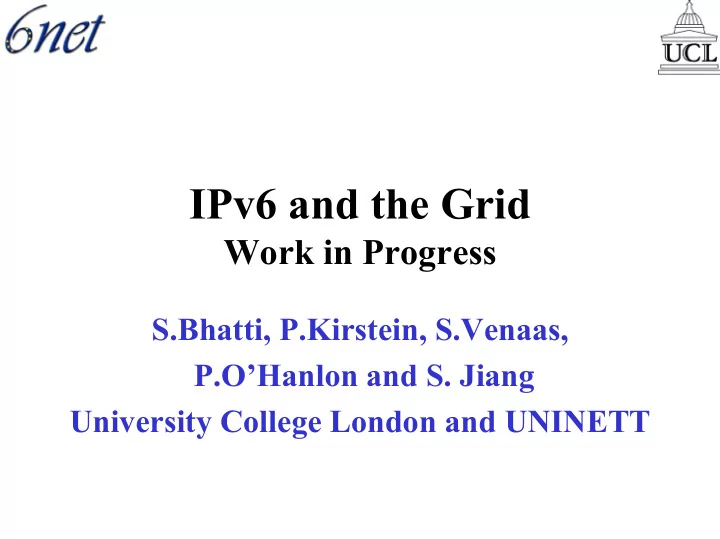

IPv6 and the Grid Work in Progress S.Bhatti, P.Kirstein, S.Venaas, P.O’Hanlon and S. Jiang University College London and UNINETT
Plan • Why is IPv6 important for the Grid • What has been our progress in porting Globus to the Grid May 22, 2003 IPv6 and the GRID 2
The Nature of the Grid • Grid is … a second chance to do distributed computing! ☺ • Many users: – Pure and Applied Sciences – Distributed Processing, High Performance – e.g. High Energy Physics, Bio-informatics • Lots of investment (EU, national) • Highly distributed - networking is vital! – It must track the best networking available May 22, 2003 IPv6 and the GRID 3
Why bother with IPv6 for grid • All better IPv4 features will come into later IPv6 implementations – but in a more integrated way – More likely to be standardly available in IPv4 – Availability and functionality of implementations variable • Examples of the above are already – Mobility support, security support, multicast and reconfiguration • Large address space is used in a far better way – 128 bit addresses allows globally unique device addresses – Even many addresses per device allows tailoring of device May 22, 2003 IPv6 and the GRID 4
Advantages of IPv6 Addresses • Will use 64 bit unique to device, 64 bit for network – Allows separation of addressing and routing – Can bind certificates to device address even when mobile • May allow convergence with UMTS methods of security • Removes the need for NATs – Allows better end-end security • A fundamental problem in the grid environment – Removes artificial separation of client and servers • Fundamental to grid – Application protocols can rely on unique correlation of addresses and devices – More freedom in design of application protocols May 22, 2003 IPv6 and the GRID 5
Specific Instance of IPv6 Addressing • IPv6 Addressing and routing – Global addresses for all end-systems (64 bits for the end systems) – Better addressing/routing scalability for all • Mobile IP support in Basic Standard – Simplified addressing (mobile address has 64-bit prefix) – Simplified routing • Better than MIPv4 – Inbuilt Security for Updates • Multi-homing feasible, but still being defined May 22, 2003 IPv6 and the GRID 6
IPv6 Configuration & Performance • Intrinsic support for Auto-configuration – Stateless (link-local, site-local) and state-full – Plug and Play – Neighbour discovery • Performance potentially much better – Simplified header and header processing – Hardware assist - just coming in commercially May 22, 2003 IPv6 and the GRID 7
Security & Group communications • Security in Basic Standard – IPsec: transport-level and tunnelling – AH: authentication – ESP: privacy • Multicast in Basic Standard – Cleaner multicast address usage • Anycast – Still being refined May 22, 2003 IPv6 and the GRID 8
Globus IPv6 Port Work in Progress Where are we at UCL in making the main Grid tool, Globus, IPv6-enabled
Making Globus GT2 IPv6 Enabled • GT2 was the previous release • Mainly written in C • Had specific routines using calls to IP in Globus I/O (GIO) – Most modifications were in GIO – Worked on TCP/IP and UDP/IP porting – UoS started TCP/IP, UCL continued both IP ports • Fairly straightforward to make either IPv4 or IPv6 – Problem was to make it dual stack May 22, 2003 IPv6 and the GRID 10
Current Globus GT3 Activity • GT3 is current release, mainly written in Java • Initially tested with JDK1.3 (not IPv6 enabled) • Moved over easily to JDK1.4 (IPv6 enabled) – Great advantage that most code was Java • In following slides things done are underlined May 22, 2003 IPv6 and the GRID 11
Different Aspects of Activity • Java SDK – Ensure working with JDK1.4 – Tested mainly in IPv4 mode – Only places where IP is called need testing for IPv6 • PostgreSQL – Installed IPv6 patch • Tomcat – Use lightweight version, with JDK1.4 • OGSA Relevant Network Communication Protocols – Probably needs little work – Need to know which parts are IPv6 sensitive May 22, 2003 IPv6 and the GRID 12
Other Activities • GT3 Stand-alone Web Container – Used only for tests, but may need upgrade • GT3 Server – Needs some work on where IPv4 calls are made • GT3 Client – Needs some work on where IPv4 calls are made • Tracking Globus changes May 22, 2003 IPv6 and the GRID 13
Non-Web Services • OGSA is web based – little problem if correct initialisation JDK parameters are used • Some other components not yet web based – Need more detailed analysis to identify changes – Grid FTP is an example of such a service • The services needed are dependent on method of usage for specific applications May 22, 2003 IPv6 and the GRID 14
OGSA Activity • GT3 is an implementation of the OGSA architecture – Includes sample OGSA services in distribution • Will need to write own services – Initially just to exercise system – Later to make use of IPv6-specific facilities • Have some high level media gateways – May make these operate in Globus environment May 22, 2003 IPv6 and the GRID 15
Longer Term Aims • Making Globus IPv6-enabled is only a beginning • Aim is then to use the underlying services that are thereby enabled in a uniform way – Though transition services must be deployed at first – Will require considerable thought to do seemlessly • It is an IETF assumption that the following services will be universally available – VPN/IPsec support, mobility, multicast, QoS, IPv6 autoconfiguration and addressing • Nevertheless it is not clear that all will be fully deployed May 22, 2003 IPv6 and the GRID 16
Full availability of IPv6 will allow provision of better Grid services May 22, 2003 IPv6 and the GRID 17
Recommend
More recommend